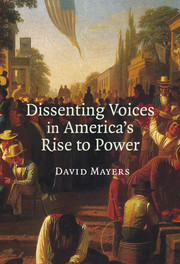4 - Removals
from Part I - Expansion
Published online by Cambridge University Press: 05 June 2012
Summary
Congressional debate over Greece in the 1820s rehearsed questions that agitated future American generations. Under what circumstances should the nation intervene abroad to promote humanitarian purposes? By what means? Cases in point were Cuba in 1898, former Yugoslavia in the 1990s. In the Bosnia-Herzegovina and Kosovo cases, a new term was coined to convey the essence of unconscionable violation: ethnic cleansing.
The Bureau of Indian Affairs (BIA) used this same vocabulary in its September 2000 confession: “This agency participated in the ethnic cleansing that befell the … tribes.” Founded as an office in the War Department in 1824, when Webster and Everett were declaiming for Greece, the BIA had long been reviled by critics. They blamed it for causing the deaths of tens of thousands of Native Americans and the degradation of countless others. Coercion, devastation of bison herds, widespread abuse of liquor plus the banning of traditional customs and religious practices constituted a tragedy. The BIA apologized for abetting it. The scale, said BIA head Kevin Gover, himself a Pawnee, had been “so ghastly that it cannot be dismissed as merely the inevitable consequence of the clash of competing ways of life.”
Six years after the BIA's establishment Congress passed the Indian Removal Act in compliance with President Jackson's wishes. It enabled Washington to intensify and systematize what had been under way since Jefferson's presidency: to exile by legal means the weak and few.
- Type
- Chapter
- Information
- Dissenting Voices in America's Rise to Power , pp. 80 - 106Publisher: Cambridge University PressPrint publication year: 2007



